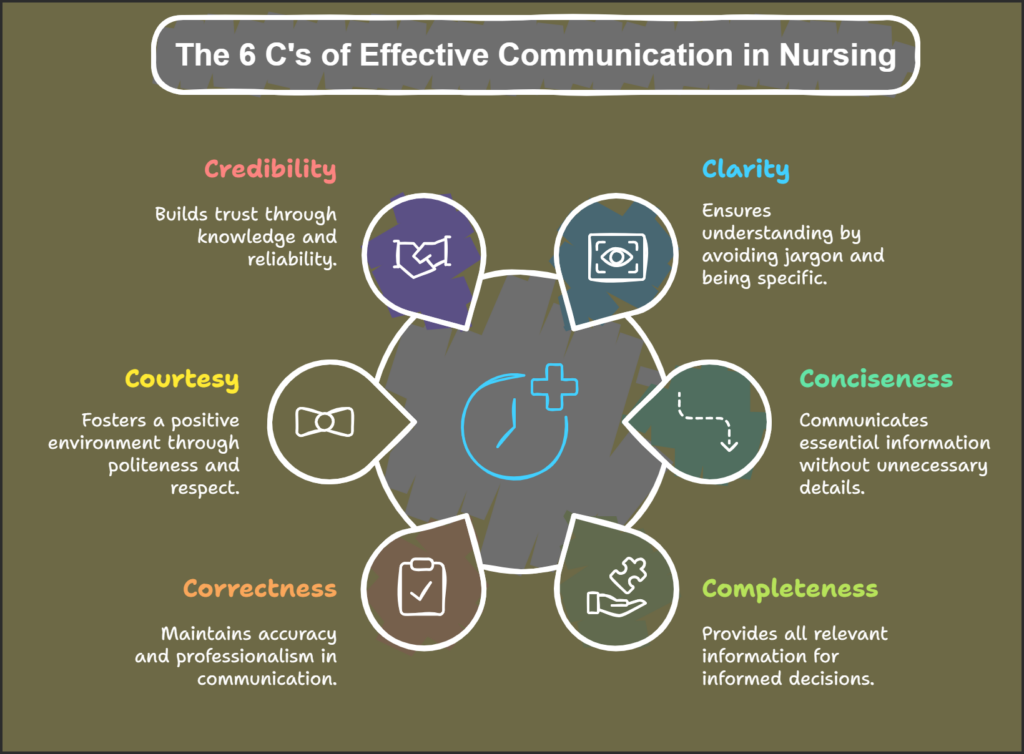
Effective communication in nursing is a cornerstone of quality patient care. It fosters trust, understanding, and collaboration, leading to improved outcomes for patients. Nurses who have strong communication skills in nursing can bridge the gap between patients and healthcare providers.
In this short blog, you will learn about effective communication in nursing from A to Z.
Why is effective communication in nursing so important?
Communication is the only means to ensure the best service & care to the patients. Let’s see the importance of communication in nursing in the following…
Patient Safety: Clear and concise communication in nursing prevents misunderstandings, medication errors, and delays in treatment. It ensures that everyone involved in a patient’s care has the information they need to make informed decisions.
Patient Satisfaction: When patients feel heard, understood, and involved in their care, they are more likely to be satisfied with their experience. Effective communication in nursing helps build trust and rapport between nurses and patients.
Team Collaboration: Nursing is a team effort. Solid communication skills in nursing among nurses, doctors, therapists, and other healthcare professionals ensure that everyone is working towards the same goals and that care is coordinated seamlessly.
Better communication skills will give you an edge in maintaining flawless team collaboration.
Improved Outcomes: Studies have shown that good communication in nursing can lead to better patient outcomes, including reduced length of stay, improved adherence to treatment plans, and higher patient satisfaction.
When patients receive clear instructions and support, they are more likely to follow their treatment plans and recover quickly. So there is no alternative for you as an aspiring nurse or an active nurse to build solid communication skills.
Know More About: How to Develop Critical Thinking Skills in Nursing?
The 6 C's of Effective Communication in Nursing

Flawless communication is essential in nursing to build trust, establish rapport, and ensure quality patient care. The 6 C’s provide a framework for effective communication in nursing:
- Clear:
Avoid jargon: Use simple language that patients can understand.
Be specific: Provide clear and concise information.
Use active voice: This makes your messages more direct and engaging.
- Concise:
Get to the point: Avoid rambling or going off on tangents.
Use bullet points or numbered lists: This can help organise your thoughts and make your messages easier to understand.
- Complete:
Provide all relevant information: Ensure your messages are complete and include all necessary details.
Double-check for accuracy: Verify the accuracy of your information before communicating it to others.
- Correct:
Proofread your messages: Check for grammatical errors and typos.
Use proper terminology: Use the correct medical terms and abbreviations.
- Courteous:
Be polite and respectful: Use a friendly and respectful tone in your communications.
Listen attentively: Show that you are interested in what others say.
- Credible:
Be knowledgeable: Stay up-to-date on the latest nursing practices and research.Be trustworthy: Build trust with patients and colleagues by being honest and reliable.
By following these 6 C’s, nurses can improve their communication skills and provide better care to patients.
Common Communication Barriers in Nursing
Language barriers: Patients may not speak the same language as their healthcare providers, making it difficult to communicate.
Cultural barriers: Differences in cultural beliefs and values can make it challenging to understand and respond to patients’ needs.
Physical barriers: Noise, distractions, and physical discomfort can interfere with communication.
Psychological barriers: Patients who need mental healthcare may be anxious, stressed, or in pain, which affects their ability to communicate effectively.
Cognitive barriers: Patients with cognitive impairments, such as dementia, may have difficulty understanding and processing information.
Strategies for Overcoming Communication Barriers
Use clear and simple language: You should avoid using medical jargon or technical terms that patients may not understand.
Use visual aids: Diagrams, pictures, and other visual aids can help explain complex concepts.
Be patient and understanding: Give patients time to express themselves and avoid interrupting them.
Use interpreters or translators: If necessary, use interpreters or translators to help communicate with patients who do not speak the same language.
Be aware of cultural differences: Learn about different cultures and customs, and be respectful of patients’ beliefs and values.
Create a comfortable and welcoming environment: Minimise distractions and ensure patients feel safe and comfortable.
Use active listening: Pay attention to what patients are saying, ask clarifying questions, and show you are interested in their concerns.
Build trust: Establish trust with patients by being honest, reliable, and empathetic.
Seek help: If you are having difficulty communicating with a patient, don’t hesitate to ask for help from a supervisor or another healthcare professional.
By understanding and addressing these barriers to effective communication in nursing, nurses can improve their communication skills and provide better care.
Interactive Quiz: How Effective Are Your Nursing Communication Skills?
To assess your current communication skills, take a short quiz:
1. When communicating with a patient, do you actively listen without interrupting?
a) Always
b) Sometimes
c) Rarely
2. Do you ensure that the patient understands the information you give them?
a) Yes, always
b) Occasionally
c) No, not always
3. Do you find yourself making eye contact and showing empathy when speaking with patients?
a) Yes, always
b) Sometimes
c) Rarely
If you answered mostly “a,” you’re on the right track! If you answered “b” or “c,” consider implementing some of the strategies mentioned above to improve your communication skills.
Final Words
Effective communication in nursing is not just a skill—it’s a vital part of patient care. By developing and honing communication skills, nurses can improve patient outcomes, build stronger relationships, and enhance the overall healthcare experience. Nurses should be aware of potential barriers to communication and take proactive steps to overcome them. Remember, communication is not just about speaking—it’s about understanding, empathising, and responding appropriately.
FAQs
Effective communication in nursing is crucial for ensuring patient safety, building trust with patients, and fostering collaboration among healthcare professionals. It can also lead to improved patient outcomes and job satisfaction for nurses.
Key communication skills for nurses include active listening, empathy, clear and concise communication, nonverbal communication, cultural sensitivity, patient education, and teamwork.
Common barriers to effective communication in nursing include language differences, cultural differences, physical barriers, psychological barriers, and cognitive barriers.
Nurses can overcome communication barriers by using clear and simple language, using visual aids, being patient and understanding, using interpreters or translators, being aware of cultural differences, creating a comfortable and welcoming environment, using active listening, building trust, and seeking help when needed.
The benefits of effective communication in nursing include improved patient outcomes, enhanced job satisfaction, and improved patient-nurse relationships.
The 6 C’s of effective communication in nursing are clear, concise, complete, correct, courteous, and credible.
 All Courses
All Courses Personal Development
Personal Development Employability
Employability Business
Business Management
Management Sports, Nutrition & Fitness
Sports, Nutrition & Fitness Microsoft Office
Microsoft Office Marketing
Marketing Health & Safety
Health & Safety Nursing & Care
Nursing & Care HR and Leadership
HR and Leadership Software
Software Language
Language Counselling and Therapy
Counselling and Therapy Teaching and Education
Teaching and Education Accounting & Finance
Accounting & Finance QLS Endorsed
QLS Endorsed Psychology
Psychology Teacher Training
Teacher Training Excel
Excel IT
IT Lifestyle
Lifestyle Health and Care
Health and Care Physical & Mental Health
Physical & Mental Health Photography
Photography Makeup and Beauty
Makeup and Beauty Powerpoint
Powerpoint Digital Marketing
Digital Marketing Animal Care
Animal Care Development
Development Bundles
Bundles Networking & Design
Networking & Design Health & Fitness
Health & Fitness Teaching & Special Education
Teaching & Special Education Leadership & Management
Leadership & Management






